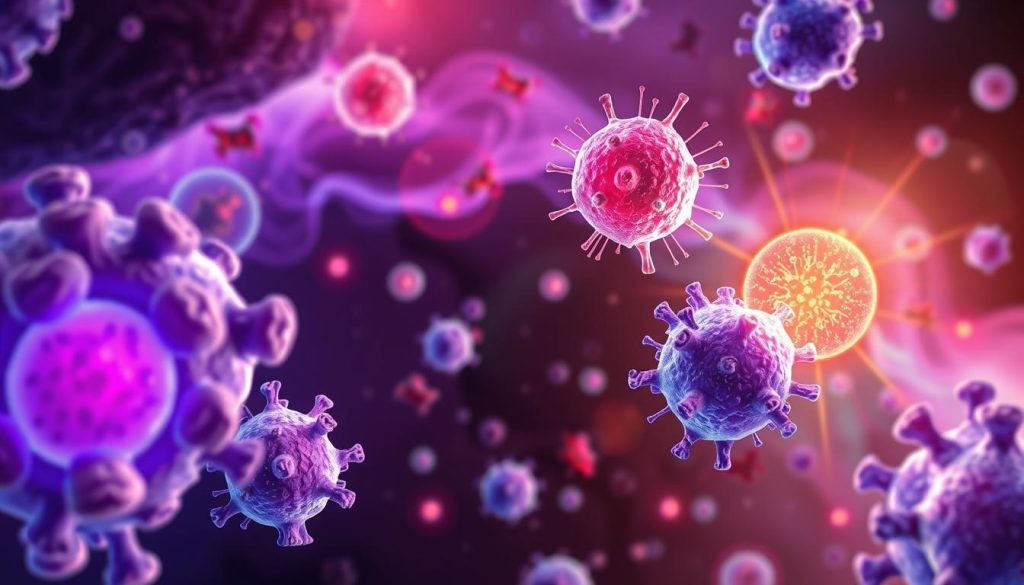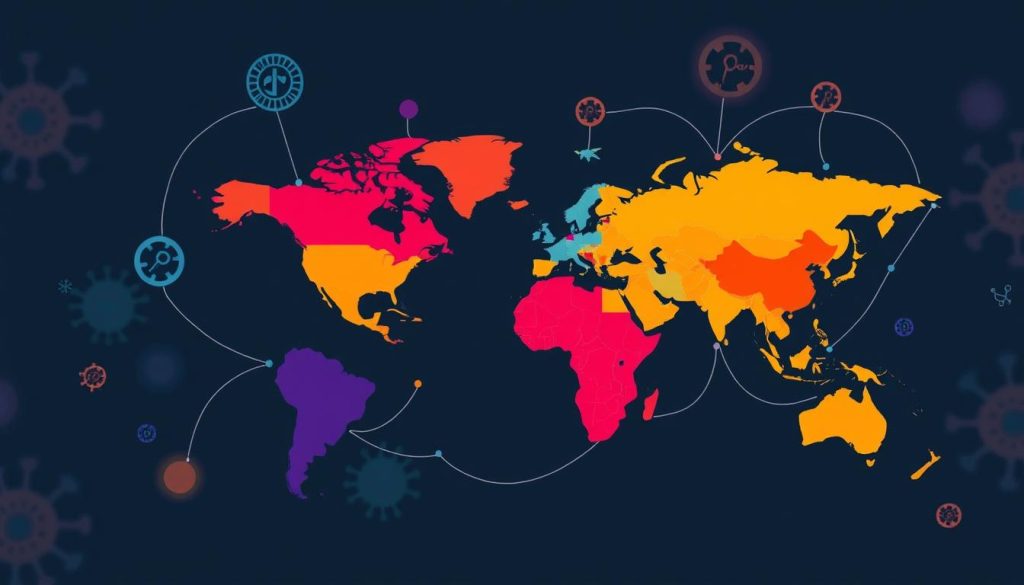As we explore cancer treatment, CAR T cell therapy stands out. It’s a new hope for those fighting cancer. We must look at both numbers and patient stories to understand its success.
Seeing CAR T cell therapy’s impact means looking at it in many ways. We’ll share real patient stories to add a human touch. This way, we can truly see how well it works.
Key Takeaways
- The successes of CAR T cell therapy span both quantitative and qualitative measures.
- Real patient experiences help illuminate the tangible impact beyond clinical trial data.
- Consideration of both short-term and long-term results is crucial for a comprehensive understanding.
- Evaluating the balance of innovative cancer treatment benefits versus potential risks.
- The role of ongoing research in optimizing CAR T cell therapy effectiveness.
Overview of CAR T Cell Therapy
Chimeric antigen receptor T cell therapy, or CAR T cell therapy, is a leading edge in cancer treatment. It uses the body’s immune system to fight cancer in a new way. This therapy is changing how we treat some cancers.
What is CAR T Cell Therapy?
CAR T cell therapy makes a patient’s T cells better at fighting cancer. First, T cells are taken from the patient. Then, they are changed to have special receptors called chimeric antigen receptors (CARs). After that, they are put back into the patient.
This change lets the T cells find and destroy cancer cells. It’s a key part of the CAR T cell therapy process.
Mechanism of Action
The way CAR T cell therapy works is both fascinating and complex. After being put back into the patient, the modified T cells grow and look for cancer cells. They find these cells because of the special receptors on their surface.
When they find cancer cells, the T cells attack and kill them. This makes CAR T cell therapy a strong and personalized treatment. The success of this therapy depends on how well the T cells are engineered to target cancer cells only.
Approved Indications
The FDA has approved CAR T cell therapy for some blood cancers. This includes certain leukemias and lymphomas. It gives hope to many patients who had few treatment options before.
As research goes on, CAR T cell therapy might be used for more cancers in the future.
Efficacy of CAR T Cell Therapy
CAR T cell therapy has changed how we treat cancer. It’s shown great results in many clinical trials. We’ll look at how well it works, its success rates, and how long patients stay in remission.
Clinical Trial Results
Recent studies show CAR T cell therapy is very effective. In diffuse large B-cell lymphoma (DLBCL), many patients got complete remission. This is a big win for those who’ve tried other treatments without success.
Response Rates in Different Cancers
Not all cancers respond the same to CAR T cell therapy. It works best in acute lymphoblastic leukemia (ALL) and some lymphomas. Here’s a look at how it performed in different studies:
| Cancer Type | Response Rate | Complete Remission Rate |
|---|---|---|
| Acute Lymphoblastic Leukemia (ALL) | 80% | 60% |
| Chronic Lymphocytic Leukemia (CLL) | 71% | 20% |
| Non-Hodgkin Lymphoma (NHL) | 52% | 45% |
Long-Term Outcomes
Looking at CAR T cell therapy’s long-term effects is key. Many patients stay in remission for a long time. This shows the therapy can make aggressive cancers more manageable. As we get more data, we see CAR T cell therapy’s lasting impact on cancer control.

Patient Experience and Quality of Life
Looking into CAR T cell therapy shows us the good and the tough parts. We see how it changes lives and the need for careful follow-up. Each part is key to understanding how patients feel after treatment.
Common Side Effects
Though CAR T cell therapy is a big step forward, it has its challenges. Side effects can be mild or serious and really affect how patients feel later. Issues like cytokine release syndrome, neurological problems, and tiredness need quick and good solutions.
Patient Testimonials
Stories from those who’ve had CAR T cell therapy show its deep effects. These stories talk about the physical and emotional changes. They show the importance of caring for patients in medical progress.
Follow-Up Care Importance
Good follow-up care is key to making CAR T cell therapy work best. Keeping an eye on patients long-term helps manage side effects and catch problems early. Regular visits, support, and talking with doctors help keep patients’ quality of life high.
| Aspect of Care | Description | Impact on Quality of Life |
|---|---|---|
| Immediate Post-Treatment Monitoring | Monitoring for acute side effects like CRS and neurotoxicity immediately after therapy. | Provides a safety net that enhances patient confidence and manages risks effectively. |
| Long-Term Health Surveillance | Regular follow-ups to check for late effects and possible disease resurgence. | Supports sustained health management, contributing to prolonged survival and well-being. |
| Psychological Support Services | Access to mental health professionals and support groups post-treatment. | Addresses emotional and mental health needs improving overall life satisfaction. |
Comparison with Traditional Therapies
Car t cell therapy effectiveness is a big step forward in cancer treatment. It’s important to see how it compares to traditional treatments like chemotherapy and targeted therapies. This will help us understand its benefits and limitations in modern cancer care.
Chemo vs. CAR T Cell Therapy
Chemotherapy attacks all fast-growing cells, not just cancer. This can harm healthy cells too, causing severe side effects. CAR T cell therapy, on the other hand, targets cancer cells more precisely. It might reduce side effects and improve results.
But, CAR T cell therapy is expensive and comes with risks like cytokine release syndrome. It’s a trade-off between cost and potential benefits.
Targeted Therapies vs. CAR T
Targeted therapies block cancer growth by targeting specific molecules. CAR T cell therapy uses modified immune cells to fight cancer. It’s known for its precision and the chance of long-term cancer protection.
Cost-Effectiveness Analysis
The economic impact of CAR T therapy is significant. The initial cost is high because each treatment is tailored. But, considering long-term benefits like fewer treatment cycles and less side effect management, CAR T cell therapy might be more cost-effective over time.

| Treatment Type | Average Initial Cost | Long-Term Effectiveness | Typical Side Effects |
|---|---|---|---|
| Chemotherapy | $30,000 | Moderate | High (e.g., nausea, hair loss) |
| Targeted Therapy | $75,000 | High | Moderate (e.g., skin issues, hypertension) |
| CAR T Cell Therapy | $350,000 | Very High | Severe (e.g., cytokine release syndrome) |
Understanding these differences helps us make better choices in cancer treatment. Patients, doctors, and policymakers need to weigh both the benefits and costs of each option. This ensures we make informed decisions about cancer care.
Factors Influencing Success Rates
Understanding what affects CAR T cell therapy success is key. Factors like patient profiling, disease traits, and when treatment starts are very important. They all play big roles in how well therapy works.
Patient Selection Criteria
Choosing the right patients for CAR T cell therapy is crucial. We look at the patient’s health, cancer type, and how they’ve done with other treatments. This helps make the therapy work best for those who need it most.
Disease Characteristics
The type of cancer and its genetic makeup are very important. Some cancers may respond better to CAR T cell therapy. This can greatly affect how well the treatment works.
Timing of Treatment
When treatment starts is also very important. Starting at the right time can make a big difference. It can help the treatment work better and prevent relapse.
Real-Life Case Studies
Looking at real-life examples of CAR T cell therapy shows how it works and its challenges. These stories share real patient experiences. They give a clear view of what CAR T cell therapy can do and its limits.

Success Story: Lymphoma
In lymphoma, CAR T cell therapy has been a game-changer. Many patients have gone into remission when other treatments failed. This shows CAR T cell therapy’s power to change lives for those with certain lymphomas.
Success Story: Leukemia
Leukemia patients have also seen big improvements with CAR T cell therapy. Many have seen a huge health turnaround, going into complete remission. These stories are a testament to CAR T cell therapy’s strength and a beacon of hope for better leukemia treatments.
Challenges in Treatment: Non-Responses
But, not every patient responds well to CAR T cell therapy. This is a big challenge that needs a lot of work to solve. Understanding why it fails for some is key to making it better. Things like the tumor’s nature or the patient’s immune system play a big role.
| Patient Group | Response Rate | Duration of Remission |
|---|---|---|
| Lymphoma Patients | High | Extended |
| Leukemia Patients | High | Varies |
| Non-Responsive Cases | Low | Short/None |
Through CAR T cell therapy case studies, we see the complexity of treating severe blood cancers. It shows why we need to keep researching and improving. These stories highlight the successes and the need for ongoing learning and better treatments.
Limitations of CAR T Cell Therapy
CAR T cell therapy has made big strides in cancer treatment. Yet, it has big car t cell therapy limitations that affect how easy it is to get and how long it lasts. It’s key for patients and doctors to know about these issues to set realistic hopes and find ways to overcome them. We’ll look at the main problems like getting access, making the treatment, and dealing with cancer coming back.
Hurdles in Access and Availability
Getting CAR T cell therapy is hard because it’s not everywhere. It needs special places and doctors with the right skills. This means long waits and not everyone can get it, especially in small towns or rural areas.
Manufacturing Challenges
Making CAR T cells is very complex and expensive. Each patient’s cells are changed in a detailed process. This makes the treatment pricey and takes a long time to start, which is bad for those who need it fast.
Concerns About Recurrent Disease
Even though CAR T cell therapy works well for some cancers, there’s worry about cancer coming back. Some patients do get cancer again. This shows we need more research to make CAR T cell therapy last longer and work better for everyone.
Future of CAR T Cell Therapy
The world of cancer treatment is changing fast, thanks to CAR T cell therapy. This therapy is getting better, offering hope to more people. It’s also being used in new ways, which is exciting.
Ongoing Research and Trials
Scientists are working hard to make CAR T cell therapy even better. They’re trying to make it work for more types of cancer. This could lead to better survival rates and a better quality of life for patients.
Next-Generation CAR T Approaches
New CAR T cell therapies are being developed. These therapies can target more than one cancer antigen at a time. This could make them more effective and reduce the chance of cancer coming back.
Expansion into Solid Tumors
Researchers are also working on using CAR T cell therapy for solid tumors. This is a big step forward. It could help more people who have been waiting for new treatments.
| Focus Area | Objectives | Expected Impact |
|---|---|---|
| Durability and Effectiveness | Enhance CAR T cell persistence in the body | Increased survival rates |
| Target Specificity | Develop multi-targeted CAR T cells | Reduce risk of relapse |
| Application to Solid Tumors | Adapt CAR T cells to thrive in solid tumor environments | Extending applications to more cancer types |
Regulatory Approval and Guidelines
The path from lab to clinic is strict. Regulatory frameworks ensure treatments are safe and work well. For CAR-T cell therapy, these rules help get treatments approved. They also make sure treatments are ethical and respect patient rights.
FDA Approval Process
The U.S. FDA has a detailed process for therapy approval. It includes preclinical trials and clinical studies. The FDA reviews everything carefully to make sure treatments are safe and effective before they reach patients.
Ethical Considerations
Medical advances bring up ethical questions. For CAR-T cell treatments, this means thinking about patient consent and side effects. These ethical standards help guide developers and regulators in bringing new treatments to the market responsibly.
Global Guidelines
Across the world, regulatory frameworks share common goals like patient safety. Countries aim to align these rules to help international work and make therapy approval processes smoother. This sets a global standard for CAR-T cell therapies and other treatments.
| Country | Regulatory Body | Approval Status |
|---|---|---|
| USA | FDA | Approved |
| EU | EMA | Approved |
| Japan | PMDA | Approved |
| Canada | Health Canada | Approved |
This table shows how CAR-T cell therapies are accepted worldwide. It shows the effort to improve patient care with advanced medical treatments.
Funding and Insurance Coverage
As more people seek CAR T cell therapy, it’s key to understand treatment funding, insurance coverage for CAR T, and financial aid in therapy. This knowledge helps patients and families deal with the financial side of cancer treatment.
Cost of Treatment
The cost of CAR T cell therapy can change a lot. It depends on who provides the treatment and the patient’s health. Costs include not just the therapy itself but also hospital stays, follow-up care, and managing side effects.
Insurance Policy Variations
Insurance for CAR T cell therapy varies a lot. It depends on your policy and the insurance company. Some policies cover a lot, while others might not cover anything, forcing patients to look for other financial help.
Financial Assistance Programs
There are many programs to help with the cost of CAR T cell therapy. These can come from the government, non-profit groups, or treatment centers themselves.
| Type of Aid | Provider | Scope of Support |
|---|---|---|
| Govermental Grants | National Health Institutes | Covers partial/full treatment costs |
| Non-profit Funds | Cancer Care Organizations | Provides subsidies and co-pay assistance |
| Hospital Assistance | Treatment Centers | Includes waivers and sliding scale fees based on income |

Patient Support and Advocacy
The journey through CAR T cell therapy is tough, both clinically and emotionally. It affects patients and their families deeply. Having strong patient advocacy and support networks is key. This part talks about how nonprofits and educational programs help patients feel supported and guided.
Role of Nonprofits
Nonprofits play a big role in helping patients. They offer many services like emotional support, help with logistics, and sometimes, financial help. These groups build strong support networks that give patients and families the strength they need during treatment.
Community Resources
Community resources can make a big difference in cancer treatment. Local support groups, wellness programs, and therapy sessions help a lot. They are important for making patients feel less alone during their treatment.
Importance of Education
Knowing about your health is crucial when dealing with treatments like CAR T cell therapy. Educational resources for cancer help make things clearer. They break down the medical terms and procedures, helping patients and families feel more confident in their care choices.
| Resource | Type | Impact |
|---|---|---|
| Online Webinars | Educational | Improves Understanding |
| Peer Support Groups | Social | Enhances Emotional Well-being |
| Financial Aid Programs | Financial | Reduces Treatment Burden |
International Perspectives on CAR T Cell Therapy
The world of CAR T cell therapy is full of life, with a lot of research happening globally. There’s a big gap in who gets this treatment, and how fast it’s adopted. Let’s look at how different places are using this new treatment.
R&D in Europe and Asia
Europe and Asia are key players in CAR T cell research. European countries are running many trials to make CAR T cell therapy better. Asia, especially China and Japan, is also working hard. They’re making treatments fit the needs of their people.
Global Access Disparities
- Availability of treatment centers
- Cost barriers
- Regulatory hurdles
Even with progress, not everyone can get this treatment. Rich countries can afford it sooner. But, poor countries struggle with money and getting the treatment.
Treatment Trends Worldwide
How fast CAR T cell therapy is adopted varies by country. It depends on the country’s healthcare and money situation. Rich countries are using it more than poor ones.

This shows we need to work together. We should share knowledge and resources. The aim is to make sure everyone can get this treatment, no matter where they are.
The Role of Genetic Engineering
In the fast-changing world of cancer treatment, genetic engineering in medicine is key. It’s especially important for personalized CAR T therapies. This method makes treatments fit each person’s genes, making them safer and more effective. We’ll see how advanced genetics improves health and safety in cell therapy.
Advances in Biomanufacturing
Biomanufacturing has grown a lot, helping personalized CAR T therapies a lot. Scientists use precise genetic changes to make T cells target cancer cells in each patient. This makes treatments work better and lowers the chance of bad reactions, making safety in cell therapy better.
Customization of T Cells
Personalized medicine starts with customizing T cells. This uses detailed genetic information. It changes the patient’s immune cells to fight cancer better. This shows how genetic engineering in medicine can change treatment for the better.
Safety Enhancements
Genetic engineering makes cell therapies safer. It focuses on making treatments fit better and less likely to cause problems. This is key for making personalized CAR T therapies work for more people.
Genetic engineering could change medicine a lot, offering new hope. As it keeps getting better, we’ll see treatments that are more effective and safer. This is a big step towards better health outcomes.
Public Perception and Awareness
As CAR T therapy becomes more common, how people see it matters a lot. By understanding CAR T therapy, we can clear up myths and spread the word. This helps everyone, including patients and the public, to better understand this new treatment.
Media Coverage of CAR T Therapy
News outlets play a big role in how we learn about new treatments. Good stories about CAR T therapy can change how people think about it. It’s important for media to share accurate info so we all know what CAR T therapy can do.
Common Misconceptions
Even though CAR T therapy works well, some people still have wrong ideas about it. They might think it can cure all cancers or that it has no side effects. It’s key to clear up these myths so patients can make smart choices about their care.
Patient Awareness Campaigns
Health groups are working hard to teach people about CAR T therapy. These efforts help raise awareness and make sure patients get the right info. By joining these campaigns, patients and their families can feel more in control of their treatment.
Ethical Implications of CAR T Therapy
The use of CAR T cell therapy is groundbreaking but raises big ethical questions. These include ethical considerations in treatment, consent in medical procedures, and making sure healthcare is fair for everyone. As this therapy moves from clinical trials to wider use, its ethical sides become clearer.
Informed Consent Process
Getting informed consent for CAR T therapy is key. Patients need to know all about the treatment’s good and bad sides. This must be done openly to meet medical ethics and build trust.
Equity in Treatment Access
Ensuring fair healthcare is essential, especially for new treatments like CAR T. This means tackling issues like who gets treated and why. These problems can be linked to money, where you live, and healthcare rules.
Ethical Research Practices
It’s crucial to follow ethical research rules, especially in trials and studies after treatment. Researchers must make sure trials are safe and respect patients’ rights and dignity.
| Aspect | Description |
|---|---|
| Consent Transparency | Ensures patients have a clear understanding of treatment implications before consenting. |
| Treatment Accessibility | Strives for universal access to treatments regardless of external factors. |
| Adherence to Protocols | Maintains strict compliance with established ethical guidelines in research and treatment deployment. |
Conclusion: The Future of CAR T Solutions
As we look at CAR T cell therapy, we see a glimmer of hope for those fighting cancer. It has changed lives by using the body’s own defenses. The data shows a bright future for CAR T cell therapy, making treatments more personal.
Summary of Findings
CAR T cell therapy has changed cancer treatment. It has shown better results and patient experiences. While there are still challenges, the data shows it can improve survival and quality of life.
Implications for Patients
This therapy means a lot for those affected. It offers a chance for remission and a return to normal life. It shows a focus on the patient, making treatments better for each person.
Directions for Future Research
The future of cancer treatment points to CAR T cell therapy. Researchers need to work on making it more accessible and safe. This will help us understand and treat cancer better, focusing on each person’s needs.
FAQ
Q: What is CAR T Cell Therapy?
A: CAR T cell therapy is a way to fight cancer. It uses a patient’s T cells, which are part of the immune system. These T cells are changed to find and kill cancer cells.
Q: How effective is CAR T cell therapy?
A: CAR T cell therapy works well for some cancers, like blood cancers. It has helped many patients get better. But, how well it works can depend on the cancer and the patient.
Q: What are the approved indications for CAR T cell therapy?
A: The FDA has approved CAR T cell therapy for certain blood cancers. This includes some types of lymphoma and leukemia. Researchers are also looking into using it for other cancers.
Q: What are the success rates of CAR T cell therapy for different cancers?
A: Success rates vary by cancer type. For some lymphomas, it works for 70-90% of patients. But, results for other cancers may be different. More research is needed.
Q: What are the long-term outcomes of CAR T cell therapy?
A: Long-term results are still being studied. Early signs are promising, with some patients staying in remission for years. More data is needed to fully understand long-term effects.
Q: What are the common side effects of CAR T cell therapy?
A: Side effects include cytokine release syndrome (CRS) and neurologic issues. CRS can cause fever and low blood pressure. Neurologic side effects may include confusion and seizures. These side effects are usually manageable.
Q: How does CAR T cell therapy compare to chemotherapy?
A: CAR T cell therapy targets cancer cells more precisely than chemotherapy. It can have fewer side effects. It’s often used when chemotherapy hasn’t worked.
Q: Are there factors influencing the success rate of CAR T cell therapy?
A: Yes, many factors affect success. These include the patient’s health, the cancer’s type and stage, and biomarkers. Each case is different.
Q: What are the challenges faced by patients who do not respond to CAR T cell therapy?
A: Patients who don’t respond face challenges like disease progression. They may need to try other treatments. Side effects can also affect their quality of life. Researchers are working to understand and overcome these challenges.
Q: What limitations exist for CAR T cell therapy?
A: CAR T cell therapy is expensive and not available everywhere. It may not work for all cancers or for long. More research is needed to improve it.
Q: What ongoing research is being conducted on CAR T cell therapy?
A: Research aims to make CAR T cell therapy safer and more effective. It includes reducing side effects and using it for solid tumors. Next-generation therapies are also being developed.
Q: What should patients know about the regulatory approval of CAR T cell therapy?
A: CAR T cell therapy is approved by the FDA for specific cancers. It goes through many clinical trials before approval. This ensures it’s safe and effective.
Q: How do funding and insurance coverage affect access to CAR T cell therapy?
A: The cost of CAR T cell therapy is high. Insurance coverage varies. Financial aid programs can help. Patients should talk to their healthcare team about funding options.
Q: How do patient support and advocacy organizations aid those receiving CAR T cell therapy?
A: These organizations provide resources and support. They help patients and families understand treatment and manage side effects. They also offer financial aid.
Q: What international perspectives should be considered regarding CAR T cell therapy?
A: Availability and standards vary worldwide. Research and healthcare systems differ. This affects patient access to CAR T cell therapy.
Q: How does genetic engineering influence the development and safety of CAR T cell therapy?
A: Genetic engineering is key to CAR T cell therapy. It allows for precise targeting of cancer cells. Advances have improved safety and customized treatment options.
Q: Why is it important to address public perception and awareness of CAR T cell therapy?
A: Public understanding is crucial. Misinformation can cause fear or unrealistic hopes. Informed public discussion supports research and development.
Q: What are some ethical implications associated with CAR T cell therapy?
A: Ethical concerns include informed consent and fair access. Transparency in reporting results is also important. Long-term effects on survivors need to be addressed.


















